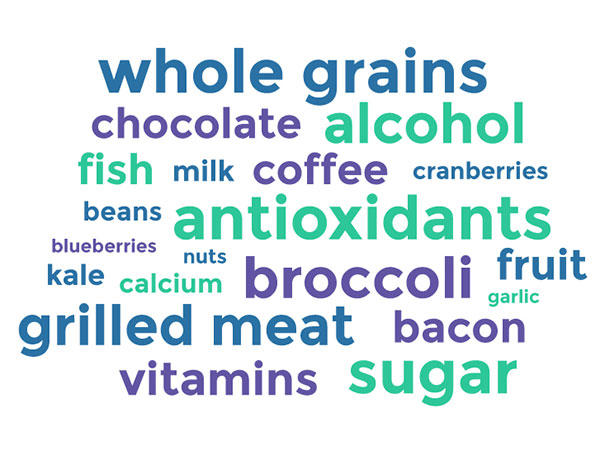Many studies have looked at the possibility that specific dietary components or nutrients are associated with increases or decreases in cancer risk. Studies of cancer cells in the laboratory and of animal models have sometimes provided evidence that isolated compounds may be carcinogenic (or have anticancer activity).
But with few exceptions, studies of human populations have not yet shown definitively that any dietary component causes or protects against cancer. Sometimes the results of epidemiologic studies that compare the diets of people with and without cancer have indicated that people with and without cancer differ in their intake of a particular dietary component.
However, these results show only that the dietary component is associated with a change in cancer risk, not that the dietary component is responsible for, or causes, the change in risk. For example, study participants with and without cancer could differ in other ways besides their diet, and it is possible that some other difference accounts for the difference in cancer.
When evidence emerges from an epidemiologic study that a dietary component is associated with a reduced risk of cancer, a randomized trial may be done to test this possibility. Random assignment to dietary groups ensures that any differences between people who have high and low intakes of a nutrient are due to the nutrient itself rather than to other undetected differences. (For ethical reasons, randomized studies are not generally done when evidence emerges that a dietary component may be associated with an increased risk of cancer.)
Scientists have studied many additives, nutrients, and other dietary components for possible associations with cancer risk. These include:
- Acrylamide
Acrylamide is a chemical found in tobacco smoke and some foods. It can be produced when certain vegetables, such as potatoes, are heated to high temperatures. Studies in animal models have found that acrylamide exposure increases the risk for several types of cancer. However, there is no consistent evidence that dietary acrylamide exposure is associated with the risk of any type of cancer in humans. For more information, see the Acrylamide and Cancer Risk fact sheet. - Alcohol
Although red wine has been suspected of reducing cancer risk, there is no scientific evidence for such an association. Also, alcohol is a known cause of cancer. Heavy or regular alcohol consumption increases the risk of developing cancers of the oral cavity (excluding the lips), pharynx (throat), larynx (voice box), esophagus, liver, breast, colon, and rectum. The risk of developing cancer increases with the amount of alcohol a person drinks. For more information, see the fact sheet on Alcohol and Cancer Risk. - Antioxidants
Antioxidants are chemicals that block the activity of other chemicals, known as free radicals, that may damage cells. Laboratory and animal research has shown that exogenous antioxidants can help prevent the free radical damage associated with the development of cancer, but research in humans has not demonstrated convincingly that taking antioxidant supplements can help reduce the risk of developing or dying from cancer. Some studies have even shown an increased risk of some cancers. For more information, see the Antioxidants and Cancer Prevention fact sheet. - Artificial sweeteners
Many studies have been conducted on the safety of the six FDA-approved artificial sweeteners (saccharin, aspartame, acesulfame potassium, sucralose, neotame, and advantame). In laboratory animal studies, these sweeteners have generally not been found to cause cancer or other adverse health effects. Most studies of the association between artificial sweetener intake and cancer in humans have also shown no increase in risk, although one large cohort study found a slight increase in cancer risk among users of several sweeteners. For more information, see the Artificial Sweeteners and Cancer fact sheet. - Charred meat
Certain chemicals, called HCAs and PAHs, are formed when muscle meat, including beef, pork, fish, and poultry, is cooked using high-temperature methods. Exposure to high levels of HCAs and PAHs can cause cancer in animals; however, whether such exposure causes cancer in humans is unclear. For more information, see the Chemicals in Meat Cooked at High Temperatures and Cancer Risk fact sheet. - Cruciferous vegetables
Cruciferous vegetables contain chemicals known as glucosinolates, which break down into several compounds that are being studied for possible anticancer effects. Some of these compounds have shown anticancer effects in cells and animals, but the results of studies with humans have been less clear. For more information, see the Cruciferous Vegetables and Cancer Prevention fact sheet. - Fluoride
Fluoride in water helps to prevent and can even reverse tooth decay. Many studies, in both humans and animals, have shown no association between fluoridated water and cancer risk. For more information, see the Fluoridated Water fact sheet. - Vitamin D
Vitamin D helps the body use calcium and phosphorus to make strong bones and teeth. Possible associations of blood levels or intakes of vitamin D with cancer have been studied in both observational studies and randomized trials. Observational studies have provided some evidence that people with higher blood levels of vitamin D might have lower risks of colorectal cancer and of overall cancer mortality. Most randomized trials have not found an association between vitamin D supplement use and cancer risk or mortality. For more information, see the Vitamin D and Cancer fact sheet.
